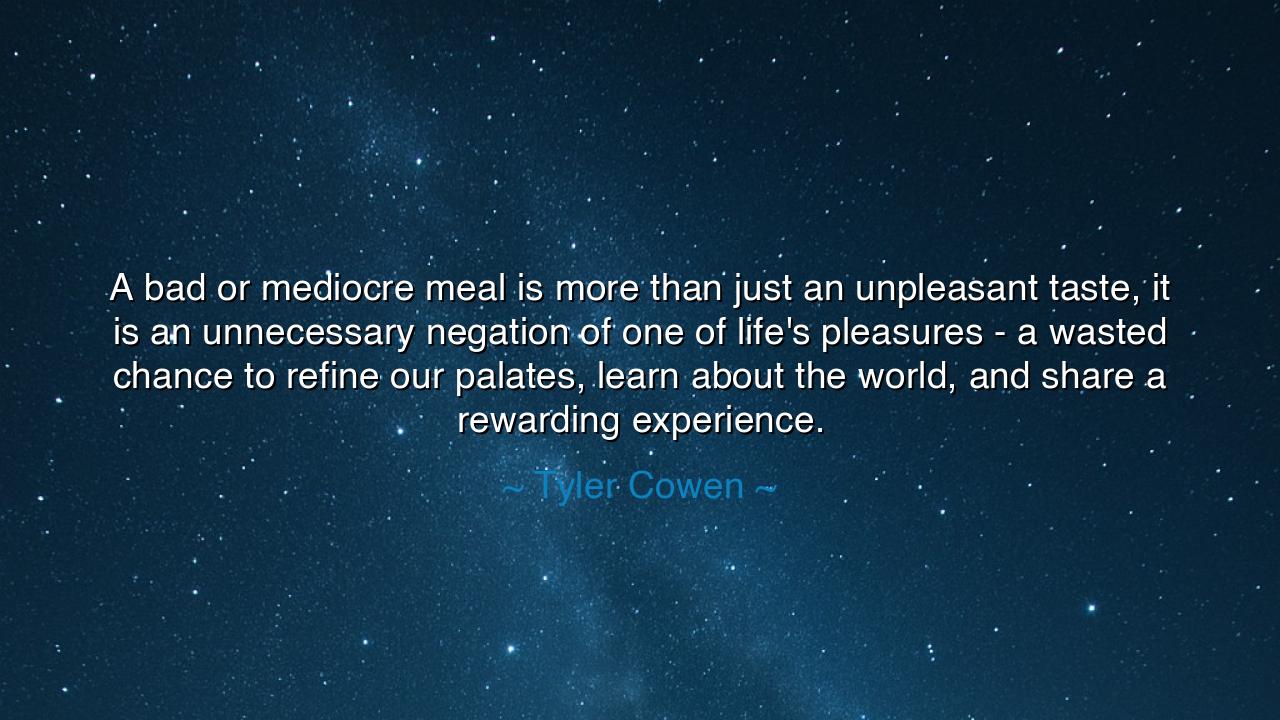
A bad or mediocre meal is more than just an unpleasant taste, it
A bad or mediocre meal is more than just an unpleasant taste, it is an unnecessary negation of one of life's pleasures - a wasted chance to refine our palates, learn about the world, and share a rewarding experience.






In the ancient world, where feasts were not merely sustenance but celebrations of life, there existed a sacred art to the preparation and sharing of a meal. Tyler Cowen, in his reflection on the significance of food, speaks with the wisdom of those who understood that a meal is far more than just the act of eating: "A bad or mediocre meal is more than just an unpleasant taste, it is an unnecessary negation of one of life's pleasures - a wasted chance to refine our palates, learn about the world, and share a rewarding experience." These words are not just a commentary on food, but a profound meditation on how meals shape the very essence of our lives, how they offer us a chance to engage with the world in ways both sensory and spiritual.
To taste is to connect—not just to the ingredients before us, but to the culture, the history, and the very hands that brought those ingredients together. When we eat, we do more than nourish our bodies; we open ourselves to the stories of the world, to the diverse landscapes that have given rise to flavors, to the ancient traditions that have passed down through generations. To consume poorly, to eat a mediocre meal, is to turn away from these stories, to fail to engage with the richness of life. It is an unnecessary negation, a missed opportunity to deepen our understanding of the world and the cultures that have shaped it. Cowen’s words call upon us to realize that every meal holds within it the potential for growth, for learning, for refinement.
Consider the great feasts of ancient Rome, where the rich and varied tastes of the empire were brought together in a grand celebration of life. The Romans, renowned for their love of food, understood that a meal was a ritual, an act of honoring the gods, of connecting with one's fellow man, and of celebrating the pleasure of the senses. Every dish was a reflection of the empire's vast territories, from the spices of the East to the fruits of the Mediterranean. To waste a meal in ancient Rome, to consume it without appreciation or awareness, would have been seen as a betrayal of the very essence of life. In this context, Cowen’s wisdom rings true: a bad meal is not just an unpleasant experience but a missed opportunity to connect with the world around us.
In our own time, the act of eating is often reduced to a mere function of necessity. Yet, there remains within each meal the potential to be a transformative experience. The humble act of eating can be a gateway to understanding the world. Consider the story of Marco Polo, the Venetian explorer whose travels to the East opened the West to new flavors and spices that forever changed the course of history. Polo, in his encounters with the people of China, was not just absorbing knowledge, but tasting and experiencing a new world, expanding the boundaries of his mind and his palate. His journey is a testament to how food can be a lens through which we see and understand the vastness of the world.
But Cowen's reflection goes deeper than just the pleasure of taste. It speaks to the greater purpose of meals: to share. A meal is not merely a solitary act but an opportunity to engage with others. It is in the act of sharing food that we form bonds, that we open our hearts, and that we create memories. The joy of a well-prepared meal is magnified when it is shared with others. To eat together is to experience a communion, a shared recognition of the pleasures that life offers. When a meal is mediocre, it robs us not only of the pleasure of taste but also of the deeper connections that food can foster.
Therefore, the lesson here is not merely to seek out better food, but to seek out the opportunity to elevate every meal, to recognize the importance of what we consume, and to approach food with a spirit of appreciation and curiosity. Every meal, no matter how simple, holds the potential to refine our palates, to expand our horizons, and to connect us with the world in ways we may never have imagined. In choosing to appreciate food, to savor each bite, we are not just honoring our senses—we are honoring the history, the culture, and the people behind every meal.
Let us, then, take Cowen’s words to heart. When we sit down to eat, let us do so with the intention to truly experience, to truly engage with the meal before us. Let us learn from the food, whether it is a simple dish or an elaborate feast, for in it lies a chance to expand our understanding of the world and to refine our own senses. And when we share a meal with others, let us remember that the act of sharing is a sacred ritual, one that binds us together in the enjoyment of life’s simplest, yet most profound, pleasures. A meal, after all, is not just about filling the body—it is about nourishing the soul.






AAdministratorAdministrator
Welcome, honored guests. Please leave a comment, we will respond soon